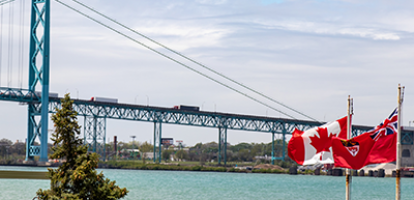As Canada forms its next government, the Prime Minister’s Office will be preparing ministerial mandate letters. In this special Intelligence Memo series, policy experts highlight key challenges and priorities in each minister’s portfolio.
From: Christian Leuprecht
To: The incoming Minister of National Defence
Date: October 31, 2019
World order and the global security environment are complex, unpredictable and deteriorating – particularly in East Asia and Eastern Europe. The mandate of the Minister of National Defence must, therefore, reflect these challenges and forge a defence team of regular, reserve and civilian members with the skillsets and capabilities to assert Canada’s interests at home, on the North American continent and abroad, as directed by the government.
The role of the defence team is to protect and advance Canada’s fundamental national interests – security, sovereignty, prosperity, a favourable world order, and our fundamental values: freedom, democracy, the rule of law and human rights.
Reliant on North American and NATO allies, Canada has become a ‘consumer’ of security. The minister must ensure Canada continues to contribute to national, regional and international security with our allies through modern, well-equipped and capable armed forces. The minister is expected to amplify and accelerate Canada’s defence strategy within the fiscal framework of Strong, Secure, Engaged: Canada’s Defence Policy while reducing partisanship in defence policy.
Among the priorities in the near term:
- Establish ministerial monitoring committees to support you in exercising civil control over defence with a focus on:
- leveraging the deputy minister’s powers under the Accountability Act to ensure that all spending is fully aligned with Strong, Secure, Engaged, prioritizing accelerated acquisition of new fighter aircraft and new surface and sub-surface combatant vessels;
- re-organizing, re-structuring and expanding the Royal Canadian Navy, Canadian Army and Royal Canadian Air Force Reserves to enhance both operational and domestic capabilities and provide opportunities for more Canadians to serve their country;
- raising the profile and reputation of the Canadian Armed Forces as the Profession of Arms in Canada, with a particular focus on the effectiveness of training, education and professional development
- recruitment, retention and attrition; including
- compensation relative to skills, competency and experience;
- competitive pension and benefits;
- ensuring the armed forces is an employer of choice;
- flexibility within Universality of Service requirement, while assuring the deployment capabilities of uniformed service.
- recruitment, retention and attrition; including
- Prepare negotiations with the United States on:
- NORAD renewal and modernization of the early-warning, identification and interception of air-, space-, and seaborne threats to Canadian and US sovereignty and security by tasking the Chief of the Defence Staff to provide military advice on:
- the fiscal, policy, legal and resource implications associated with full NORAD operational integration if Canada were to join the Ballistic Missile Defence program.
- efficiencies and economies of acquiring a fixed-wing combat platform to protect the continent jointly with Canada’s US allies and remedy attrition among fighter jet pilots while avoiding excessive multi-fleet operating costs and interoperability limitations with the US and allies.
- a Civil Response Pact to formalize an integrated continental response to natural disasters.
- NORAD renewal and modernization of the early-warning, identification and interception of air-, space-, and seaborne threats to Canadian and US sovereignty and security by tasking the Chief of the Defence Staff to provide military advice on:
- Deepen defence cooperation under the Canada-European Union Strategic Partnership Agreement by joining in the EU’s Permanent Structured Cooperation.
In the medium term, the minister shall commission reviews to:
- Take the lead on establishing a Canadian Defence Procurement Agency and prepare associated changes in departmental mandates to assure timely and cost-effective procurement while ensuring seamless interoperability with United States and NATO.
- Gauge benefit to Canada by prioritizing delivery timelines, capability and cost over Industrial and Technology Benefits (ITB), and reinvest defence offsets in capital spending to further defence renewal.
- Engage the National Security and Intelligence Advisor to build capacity to generate strategic intelligence assessments to guide the ends, ways and means of potential needs for military and civilian whole-of-government response to alleviate suffering or manage crises with a bearing on Canadian interests and values.
Christian Leuprecht is Class of 1965 Professor in Leadership at the Royal Military College and director of the Institute of Intergovernmental Relations at Queen’s University. He is also Eisenhower Fellow at the NATO Defence College.
To send a comment or leave feedback, email us at blog@cdhowe.org.
The views expressed here are those of the author and do not reflect those of the Government of Canada or the C.D. Howe Institute, which does not take corporate positions on policy matters.





